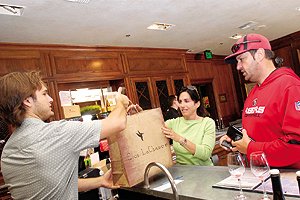”
Say you’re sending some of your champagne to somebody, because
they’d really like a case of it for their wedding,
”
said Rapazzini winemaker Alex Larson.
”
I don’t want to go to jail for that.
”
That’s one hypothetical scenario Larson conjured, in the event
House of Representatives bill 5034 passed. The federal bill, known
as the Comprehensive Alcohol Regulatory Effectiveness Act of 2010,
would reinforce a state’s existing rights to regulate its own
alcohol commerce
– with the added immunity of not being challenged on it.
“Say you’re sending some of your champagne to somebody, because they’d really like a case of it for their wedding,” said Rapazzini winemaker Alex Larson. “I don’t want to go to jail for that.”
That’s one hypothetical scenario Larson conjured, in the event House of Representatives bill 5034 passed. The federal bill, known as the Comprehensive Alcohol Regulatory Effectiveness Act of 2010, would reinforce a state’s existing rights to regulate its own alcohol commerce – with the added immunity of not being challenged on it.
The bill was introduced April 15 to the U.S. House of Representatives and committee meetings were held Sept. 29, leaving many wineries on alert.
Cheryl Murphy, vice President of Sales and Marketing for Close la Chance Winery, said she’s all for state regulation. It’s what could happen if the states are granted the ability to pass laws that are discriminatory – that has niche winemakers such as herself concerned.
Giving states unchangeable power, where a state can basically say yes or no to people who can ship in or out is not the answer, Murphy said.
Paul Pisano – senior vice president of Industry Affairs and General Counsel for the National Beer Wholesalers Association – said H.R. 5034 just re-clarifies what a state currently has the right to do, but makes it be harder for state laws to be challenged and overturned.
“Our view is the current system is great,” the H.R. 5034 supporter, said. “We’re just trying to preserve the current system.”
Smaller winemakers such as Murphy and Larson speculate if H.R. 5034 passes, wholesalers might lobby for tighter clenches on out-of-state sales.
Bigger distributors have the money and with that comes the power to lobby – for things such as regulations that complicate producer-to-consumer shipping, Murphy said.
That could corral more producers into having to go through wholesalers to get their product out of state, Murphy, said.
“I have 25 wines, and eight of them are in distribution,” she said. “Wholesalers don’t take on small brands anymore. In a lot of states, it’s very difficult to get wholesale distribution. You’ll have five or six people deciding who gets what wine in what state.”
Jeremy Benson, executive director of Free the Grapes, says H.R. 5034 gives states the ability to pass laws that are currently unconstitutional, without any sort of legal recourse from consumers. His self-described “national grassroots coalition” has been the main opponent of the wholesaler-backed bill.
“For example, right now if California allowed only California wineries to ship to you in Gilroy, but prohibited a wine in Oregon from shipping to you, that would be unconstitutional,” he said. “States have right to regulate, but they don’t have right to discriminate.”
By no means are wholesalers bad, said Murphy. But there’s room for both.
For example, she says, if an out-of-state couple comes to Clos la Chance, tries the Grenache and says, “This is the best wine I’ve ever had,” Murphy might not be able to ship the wine to them – should laws on direct shipping prevent her from doing so.
Pisano said it’s difficult to respond to fears based on speculation.
“It’s the state’s call under the present law, and will be under future law when this bill passes,” he said. “The question is trying to separate the facts from the fears. This bill won’t mandate states ban direct shipping. The fear is if this bill is passed, stuff like that might happen.”
Benson sees it differently. He said H.R. 5034 is couched as a bill that’s in the interest of state’s rights – but what it really does is immunize states from any sort of legal challenge for setting laws that are unconstitutional, such as discriminatory laws on direct shipping.
“And that’s bad for us, as business people,” says Larson, who explained decidedly local wineries such as Rapazzini don’t have distributors in every state.
“It’s crazy that anybody should be able regulate somebody else’s business,” he said. “It would be me like saying hospitals can have a kidney research center, but they shouldn’t be able to have a liver research center.”
Benson said the current system in place – there are 37 states that can legally ship directly – permits states to regulate, but not discriminate.
And it’s working just fine.
“It allows people the ability to purchase pinot noir from an Oregon winery who only produces a few thousand cases, and doesn’t have enough wine or money to sell to a wholesaler,” he said. “Direct shipping allows a limited amount of wineries to sell to a limited amount of wine. Taxes get paid, and state regulators are happy.”
Larson is skeptical about the whole thing.
“It’ll be like marijuana,” he said. “If they pass something that’s ridiculous, people are going to do it anyway, and say ‘Catch me if you can.’ There’s going to be ways around it – but it shouldn’t have to be like that.”
What is H.R. 5034?
– Proposed legislation designed to reaffirm and protect
the primary authority of states to regulate alcoholic beverages, and classify alcohol as different from other consumer products.
– Supporters of the bill say: H.R. 5034 strengthens a state’s existing rights to regulate its own alcohol commerce.
– Opponents say: States already have the power to regulate alcohol commerce. H.R. 5034 would make that power unchangeable, that opponents fear could lead discriminatory laws toward direct shipping.














